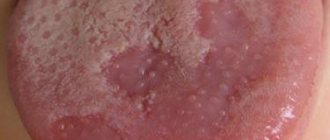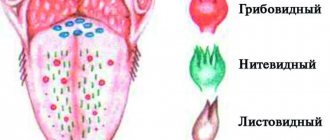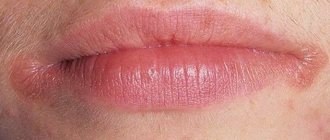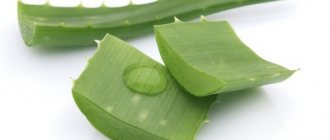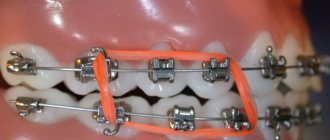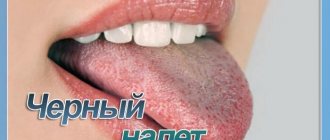The tongue has several functions in our bodies. There are thousands of taste buds on its surface, thanks to which we recognize the taste and aroma of food. But above all, it is a strong muscle with which we can speak and swallow. A healthy tongue is pink, almost smooth and elastic, and touching it should not cause pain. But if something is wrong in the body, the appearance of this muscle also changes.
What can you tell by the appearance of your tongue?
In traditional medicine, the phrase: “Show your tongue!” is usually said by a therapist and an otolaryngologist who want to examine a patient’s throat. But in Chinese traditional medicine, for more than a millennium, doctors have been diagnosing a person’s health condition by his tongue. But for maximum accuracy of diagnosis, it is recommended to examine the muscle in the morning, in good lighting, and preferably before eating and brushing your teeth.
It is interesting that even before examining the pattern on the surface of the organ, experts even pay attention to how the patient opens his mouth.
Content:
- What can you tell by the appearance of your tongue?
- Surface structure
- Color
- Plaque and possible diseases
- If your tongue hurts or burns
- What does tongue size tell you?
- What about your taste buds?
- Effect of medications on the appearance of the tongue
For example, if a person does this timidly and shows only part of his tongue, as if embarrassed, to Chinese healers this fact indicates a lack of vitality. If the patient sticks out his tongue, tilting its tip to one side, this can be perceived as a signal that there are problems on that side of the body.
According to Eastern medicine, any changes in individual parts of the organ are not an accident. The Chinese even developed a map of the relationship between individual parts of the tongue and internal organs. So, according to this theory, the language is usually divided into 5 functional zones.
Tip
This part is a “mirror” of the state of organs such as the heart and small intestine. In addition, redness on the tip of the tongue or bright spots on it may indicate anxiety or stress.
Piece by tip
By studying the state of this zone, we can draw a conclusion about the normal functioning of the respiratory and immune systems. Changes in this area may indicate bronchitis, tuberculosis, pneumonia or emphysema.
Center
The middle part of the tongue informs about the functioning of the digestive system, in particular the stomach, pancreas and spleen. Redness or yellow spots in this area indicate gastrointestinal diseases. Any changes in the central part may also be a sign of problems with stool: diarrhea or constipation.
Right and left side
These areas reflect the condition of the liver. If the sides of the tongue are swollen, this may be a signal of hepatitis or fatty liver disease. Sometimes such changes appear in people with diabetes or flatulence. Dark spots around the edges sometimes appear in the presence of cirrhosis or liver cancer.
Back (back)
Any changes in this area may indicate renal failure, bladder dysfunction, dysfunction of the gonads, or disruptions in the endocrine system. In particular, a yellow coating on the back may indicate an infectious disease of the bladder, other changes may indicate urethritis or kidney disease.
Possible complications
If you consult a doctor in a timely manner, you can prevent the development of complications. If you neglect the pathology, you can provoke the appearance of plaque and face the following consequences :
- gastritis of the stomach;
- ulcer;
- bowel cancer;
- liver cirrhosis.
Complications also depend on the cause of the white plaque:
- Caries . In the future, pulpitis may appear, which is an inflammation of the nerve of the tooth.
- Stomatitis . If this pathology is not treated, it will become chronic. An aphthous form of the disease may develop, affecting a large area of the mucosa.
- Candidiasis . The fungus can spread to organs and cause nephritis, meningitis, and endocarditis.
- Pancreatitis . The disease can cause swelling of the brain and disrupt kidney function.
- Gastritis . Pathology can lead to a decrease in the secretory function of the stomach and impaired absorption of nutrients.
- Cold . The most common complications are otitis media, tonsillitis, rhinitis, sinusitis, tonsillitis.
- Diabetes . The disease can cause damage to the kidneys, liver and even death of the patient.
- Hypovitaminosis . Lack of vitamins can lead to disability.
The prognosis is made individually and depends on the patient’s health status and the advanced stage of the disease. In the case of pathologies such as HIV, it is unfavorable. It is only possible to temporarily support the body and continue to follow body cleansing procedures.
In the absence of quality treatment, serious complications can occur. Therefore, do not risk your health and at the first alarming symptoms, consult a doctor.
Surface structure
If cracks have formed on the surface of the tongue, this usually indicates dehydration and excessive blood thickening, which, in turn, increases the risk of stroke or thrombosis. Also, a dry surface with numerous small cracks is one of the symptoms of diabetes. But depending on their location, cracks can indicate different diseases. For example, one deep one in the middle of the tongue can be a symptom of an upset digestive system and high acidity in the stomach.
A spotted or raised tongue may indicate that a person has fungal infections, vitamin deficiency or allergies.
Sometimes such changes appear in people with vitiligo or psoriasis. But if a curved line is clearly visible on the surface, then the musculoskeletal system should be checked; this may be a signal of a spinal disease.
Color
A healthy person's tongue should be slightly pink. Any changes in color can be regarded as a signal of health problems.
Crimson or violet-tinged
The tongue may acquire this color due to an excessive increase in body temperature caused by inflammation or an infectious disease. Blueness of the tongue often indicates hypoxia (impaired blood supply), and a purple tint sometimes appears after eating too spicy foods.
Scarlet
In people who have a poor diet or are obese, the middle part of the tongue may be bright red. Similar symptoms appear with gallbladder diseases or blood stagnation. If redness is visible on the tip of the tongue, this may be a sign of chronic stress, cardiac disorders, or insomnia and neuroses. If the tip of the tongue is bright red and slightly swollen, there is reason to believe that the person is suffering from coronary heart disease. Additionally, red spots on the surface may be a sign of B vitamin deficiency.
If the tongue is not just bright red, but also completely smooth, this indicates liver disease, toxin poisoning, as well as a lack of vitamin B12 and iron, since this mineral is necessary for the formation of papillae on its surface. By the way, this type of tongue can be seen in vegetarians. But if a person eats a more or less balanced diet, but his body still lacks vitamins, perhaps the reason is an autoimmune disease, due to which nutrients are not absorbed. And this can also be suspected by the unnaturally red and smooth tongue. In some cases, a smooth, very red surface may be the result of a burn or overuse of hot spices. Red spots on an unnaturally pale surface are a signal of disturbances in the respiratory system. A scarlet and grainy tongue most often indicates scarlet fever.
Very pale, almost white
Such an anomaly may indicate several serious diseases. The tongue turns pale at very low body temperatures, due to anemia, a weakened heart, or when the immune system is impaired.
Black
A very dark, almost black tongue always indicates kidney dysfunction. In addition, it does not matter in which particular zone the dark spots appeared, although most often in such cases the base of the tongue turns black.
White spots on the mucous membrane
Sometimes painless white spots may form on the tongue (bottom or along the edges). Medically they are known as leukoplakia. They are formed as a result of excessive cell growth. Smokers often have such spots. And in this case, this is a very alarming signal. Leukoplakia is called a precancerous condition. Between 5 and 17% of people with these spots eventually develop cancer. However, if you quit smoking in time, the spots will disappear. If such spots appear in non-smokers, then perhaps their cause is banal rubbing of the tongue by the teeth. But if leukoplakia does not go away, you should consult a dentist to solve the problem.
Diagnostics
If you suspect a problem with your body, rush to see your local physician. It will help to find out the causes of the white deposits. Typically, primary diagnosis includes :
- examination of the tongue;
- general analysis of blood fluid;
- smear to check flora;
- Ultrasound of organs;
- urine check.
If a light coating has accumulated on your child's tongue, make an appointment with your pediatrician as soon as possible.
Differential diagnosis
In some cases, you will need to consult specialists working in the field of gastroenterology and endocrinology. In case of a fungal infection, an examination by a dermatologist will be required. In case of dental defects, the therapist will send the patient to the dentist.
The doctor must examine the patient and ask questions about his state of health and well-being , namely:
- Are there any changes in taste?
- Are there any bad habits?
- Does pain in your mouth bother you?
- What ailments worry you?
- When was the plaque first discovered?
- What drugs are currently in use?
A gastroenterologist may prescribe the following procedures :
- Ultrasound of the abdominal cavity;
- gastroscopy;
- fibrogastroduodenoscopy.
To clarify the cause of the white plaque, you will need a test for HIV, syphilis, hepatitis or gonorrhea, stool culture for dysbacteriosis and the presence of helminths.
The endocrinologist will check the thyroid gland and lymph nodes. Additionally, he may need the results of blood tests for hormones, ultrasound, CT or MRI of organs.
Reference! It is necessary to treat a specific disease, not a white coating.
Plaque and possible diseases
During normal functioning of the body, the human tongue is covered with a thin, loose layer of whitish plaque. If it changes color or thickness, this is already an alarming signal.
White
A dense white coating can appear as a result of hypothermia or a slowdown in metabolism (this often happens in the fall). If the plaque is uniform, but very thick, this indicates the presence of a bacterial infection in the body, and if it forms lumps, this is a signal of a fungal disease.
A thick layer of white plaque also occurs with chronic gastritis with high acidity or enterocolitis. With gastritis with low acidity, the plaque is not as thick and drier. It is also interesting that by the thick white coating on the tongue you can recognize those with a sweet tooth and lovers of dairy products.
Grey
Gray plaque is a sign of infectious diseases accompanied by fever. Also, a grayish coating may indicate diseases of the gastrointestinal tract or liver. In particular, the tongue may acquire a grayish tint during an exacerbation of peptic ulcer disease. If a gray coating appears in the company of small blisters on the tongue, the person may be suffering from herpes. A grayish coating can also signal that the body lacks iron.
Brown
Most often, a tongue with a dense brown coating can be seen in smokers. The same symptom indicates disturbances in the respiratory system, which can lead to hypoxia. Also, brown plaque is a signal of digestive problems.
Yellow
If such a plaque appears in a person in the summer, this may indicate overheating of the body. The surface of the tongue also turns yellow after drinking coffee or certain spices. In more serious cases, the appearance of yellow plaque indicates a gastric ulcer, malfunction of the pancreas or liver.
Greenish
Plaque with a green tint is a very alarming signal. As a rule, it warns of serious liver diseases, including the development of cancer.
Using rinse aids
You can use rinses to clean your tongue only in conjunction with all other hygiene procedures. The choice depends on the condition of the gums and teeth:
- For loose, bleeding gums, you need to choose a rinse with a high content of fluoride and oak bark extracts.
- Coniferous tree extracts included in the mouthwash thoroughly sanitize the oral cavity, destroying bacteria.
- Zinc chloride, which is part of the mouthwash, helps keep teeth white and prevent the formation of tartar.
Using mouthwash ensures fresh breath.
Colloidal silver is a natural antiseptic
It is advisable to have colloidal silver in your home medicine cabinet, which is an excellent antiseptic and antibiotic. It destroys bacteria, fungi, and viral infections.
It can be used to treat your hands, mouth, and even be taken orally. The product is a suspension of silver microparticles in distilled water. They treat wounds with it, and rinse the mouth with the solution for any problems with the oral cavity, including plaque on the tongue.
Propolis tincture to cleanse the tongue
Propolis tincture, which can be purchased at any pharmacy, does an excellent job of sanitizing the oral cavity. It is used:
- for rinsing - prepare a solution at the rate of 15 ml of tincture per 100 ml of water and rinse your mouth after each meal;
- to clean the tongue - use undiluted tincture, apply to a tampon and clean the tongue from root to tip, changing the tampon each time.
Before you start cleaning with propolis tincture, you should test for an allergic reaction. Use a cotton swab soaked in the solution to clean a very small area of your tongue. Wait at least 12 hours for the reaction. If no manifestations of allergies occur, then you can clean the surface of the entire tongue.
Herbal decoctions to get rid of plaque on the tongue
Using herbal decoctions to sanitize the oral cavity is a great idea. But it is unreasonable to expect that simply rinsing will get rid of plaque on the tongue. Decoctions of medicinal herbs should only be used in combination with other cleaning methods. Herbal decoctions are ideal for rinsing the mouth:
- from oak bark;
- calendula;
- sage;
- chamomile;
- peppermint;
- lemon balm.
It is not difficult to prepare such a decoction:
- Buy a herbal mixture or use a monocomposition at the rate of 1 teaspoon of herbs or herbal mixture per 100 ml of water.
- Pour boiling water over it and leave over low heat, avoiding boiling, for 10–15 minutes.
- Cool and strain.
The decoction can be used to rinse your mouth after mechanical sanitation.
Method of mechanical tongue cleaning
Mechanical methods of getting rid of plaque on the tongue include:
- cleaning with the grooved side of a toothbrush or a special brush;
- the same action using a special scraper in the form of a plastic ring;
- cleansing with a teaspoon or a special scraper that resembles one.
The method of application is simple - you need to scrape off the plaque from root to tip, each time rinsing the scraper under running water.
The main thing here is not to overdo it. Do not press too hard on the tongue to avoid damaging the papillae and causing bleeding. After mechanical cleaning, be sure to rinse your mouth with a decoction of herbs, mouthwash or colloidal silver solution.
Cleansing the mouth with vegetable oil
This method of cleansing the oral cavity from any infectious lesions was known to our forefathers. It will help not only get rid of plaque, but also solve problems with caries, periodontal disease, and gingivitis. There are no contraindications for it, and the benefits will be obvious after the first procedure. The essence of the method is as follows:
- In the morning on an empty stomach or in the evening, 3 hours after the last meal, take 1 tbsp into your mouth. a spoonful of unrefined vegetable oil.
- Next, for 10 minutes, you need to rinse your mouth with this oil through closed teeth, without swallowing it.
- Ideally, the oil should turn white or dirty gray depending on your health.
- The oil is spat out, and the mouth is rinsed with water or herbal decoctions.
This procedure brings tangible results - bad breath disappears, plaque disappears, gums become stronger, and teeth become healthy and shiny. General well-being improves.
How to use saline or soda solution
You can also use a saline or soda solution only in combination. This procedure alone will not bring the desired result. But this solution is quite suitable as a rinse.
It is enough to dissolve 1 teaspoon of soda or ½ teaspoon of salt in 200 ml of boiled water, cool to room temperature and rinse the mouth after mechanical cleansing of plaque.
You shouldn't self-diagnose. If you have any suspicious symptoms, consult a specialist.
If your tongue hurts or burns
In many cases, painful sensations in the tongue appear as a result of not following a balanced diet. In particular, pain can occur due to a lack of iron, vitamins B6, B3 (PP) and B12.
A burning sensation on the surface of the muscle may indicate that the stomach is producing too few digestive juices, so this symptom usually indicates a malfunction of the gastrointestinal tract.
Sometimes, if the tongue looks no different, but there is a burning sensation, this may indicate a hormonal imbalance. By the way, women experience this symptom almost 7 times more often than men. In addition, the burning sensation may be the result of an allergy to the wrong toothpaste.
Professional cleaning at the dentist
Even such thorough self-cleaning of the oral cavity is not enough to be sure that you will be free from periodontal disease or caries. From time to time it is necessary to contact a dentist so that he can carry out professional sanitation. Typically it includes:
- preventive examination and assessment of the condition of gums and teeth;
- removal of tartar mechanically or using ultrasonic devices;
- treatment with a special powder mixture to get rid of food pigmentation of teeth, typical for smokers, lovers of strong coffee and tea;
- final flossing to remove tartar fragments from the most difficult to reach places;
- polishing using a special paste to create the most even surface relief of the teeth.
It is recommended to carry out such cleaning every six months, in case of predisposition to caries and periodontal disease - once every 3 months.
What does tongue size tell you?
If we carry out diagnostics based on the appearance of the tongue, then experts also advise paying attention to its size. If it is excessively large and swollen (touches the corners of the mouth), you should check for problems with the heart, thyroid gland, spleen, kidneys.
The tongue increases in size with anemia, allergies, or if for some other reason the whole body swells in a person, as well as in people who are overly nervous. Swollen veins under the tip of the muscle may indicate heart failure.
If the tongue is smaller than normal size, then it is quite possible that the body is suffering from a deficiency of vitamins and minerals, and this may also be a symptom of a very weakened immune system.
Preventive measures
To prevent plaque formation, follow preventive measures , namely:
- clean your tongue and teeth regularly;
- if you have dentures, treat them with antiseptic;
- avoid close contact with people with candidiasis;
- After each meal, rinse your mouth with water;
- follow the vaccination schedule;
- drink drinks based on ginseng and lemongrass;
- carry out hardening under the supervision of a doctor;
- do not take antibiotics without a doctor's prescription;
- immune strength is constantly strengthened;
- do not get carried away with alcoholic drinks and smoking;
- promptly treat gastrointestinal pathologies;
- try to be less nervous;
- Visit your dentist 1-2 times a year for an oral examination.
Particular attention should be paid to your diet. It must be complete and balanced. Eat foods rich in vitamins and minerals, fats and proteins every day.
Include the following products in your menu:
- soups and broths;
- dairy products;
- whole wheat bread;
- fruits and vegetables;
- sauerkraut;
- river and sea fish;
- dried fruits;
- fiber;
- cereal porridge;
- jelly;
- natural juices;
- pasta.
Eliminate from your diet:
- soda;
- alcohol;
- spicy dishes;
- everything is fatty and fried;
- chocolate;
- candies:
- cakes;
- White bread;
- baked goods;
- smoked meats;
- canned food
The following rules for caring for dentures deserve special attention :
- Don't sleep with your dentures on at night. Handle devices with care.
- Clean their surface thoroughly before use.
- Store orthopedic structures in warm water or a special solution.
- Do not use powders for cleaning.
If you suspect problems with the oral cavity, contact your clinic immediately.
3 ways to clean your tongue:
What about your taste buds?
On the surface of the tongue there are thousands of small pimples - these are papillae. All of them can be divided into 6 groups, each of which plays its own role, including the ability to distinguish four basic tastes: sweet, salty, bitter and sour.
Interestingly, over time, taste buds “wear out,” but if a person is healthy, they are replaced by new “pimples.” At a young age, this process occurs quite quickly, and after 45 years, as a rule, it slows down.
Best materials of the month
- Coronaviruses: SARS-CoV-2 (COVID-19)
- Antibiotics for the prevention and treatment of COVID-19: how effective are they?
- The most common "office" diseases
- Does vodka kill coronavirus?
- How to stay alive on our roads?
Therefore, with age, a person ceases to distinguish tastes and aromas so keenly. But sometimes the inability to taste food is not just due to age. Loss of sensitivity in taste buds may be a symptom of a bacterial infection in the digestive tract or indicate problems with the pancreas.
Prevention
Dark spots on the tongue will never bother you if you follow the following rules and recommendations:
- Minimize the consumption of spicy, fatty, carbonated water, coffee.
- Maintain good oral hygiene. In addition to teeth, clean the inside of your cheeks, gums, and tongue. Teach children to this. Use plant extracts for rinsing. Don't skimp on toothpaste.
- Get rid of bad habits: smoking and alcohol abuse.
- When treating with antibacterial compounds, strictly follow medical recommendations.
- Expand the amount of physical activity in accordance with age and health status.
- Add bran, fruits, and vegetables to the menu. Nutritious smoothies are beneficial. Instead of black tea, drink mint, strawberry, linden or other herbal tea.
- If you are prone to sore throat, try not to injure the mucous membrane of the throat, for which purpose eat dishes in the form of puree. Inhalation is carried out using sea buckthorn or fir oil.
- If a child’s tongue turns black, consult a pediatrician to find out what new food triggered such a symptom, so that you can then help the child adapt painlessly. Treatment methods for children do not differ from those for adults. Great care and smaller dosages will be required, as determined by your doctor.
- Baby food should be natural and consist of fresh products. On the recommendation and under the supervision of a pediatrician, vitamin and mineral complexes can be given to the child to strengthen the immune system.
Do not practice self-medication, which rarely ends well. If the condition worsens, immediately contact a doctor. Regularly visit an ENT doctor, dentist and other specialists for preventive purposes. Bitter salt for cleansing the intestines, you can find out at the link.

